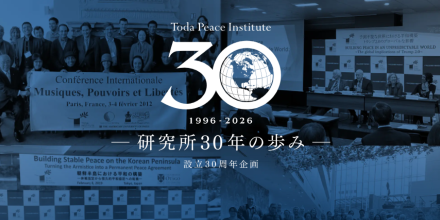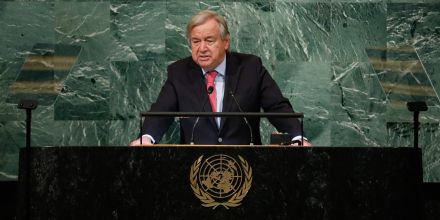Toda Peace Institute marks 30 years
Feb 2026 - News
Today marks the 30th anniversary of the founding of the Toda Peace Institute. To celebrate the occasion, the Japanese version of the Toda Peace Institute website carries a timeline of notable events from the past 30 years. In addition, an article in the Seikyo Shimbun features an interview with the new director of Toda Peace Institute, Dr Stein Tønnesson, in which he outlines his dedication to the cause of peace which was established from childhood, as he attended anti-nuclear demonstrations with his father. He remembers his mother trembling with fear during the Cuban Missile Crisis. "I was also influenced by my encounter with Dr. Daisaku Ikeda, founder of the Toda Peace Institute," said Dr Tønnesson. "As the then-director of the International Peace Research Institute, Oslo (PRIO), I visited Japan in 2002 to present Dr. Ikeda with an award for his contributions to peace studies. Whatimpressed me most during our meeting was Dr. Ikeda's willingness to listen and learn. Rather than expressing his own views, he asked carefully prepared questions and listened intently to what I had to say. It seemed as though Dr. Ikeda expected me to speak more than he did. This spirit of dialogue is the key to overcoming the divisions of our time."
UN chief warns of a world in chaos as impunity and unpredictability spreads
Jan 2026 - News
In his final annual address, speaking to the UN General Assembly, UN Secretary-General António Guterres warned that the world is “brimming with conflict, impunity, inequality and unpredictability” – even as international cooperation is fraying at the moment it is most needed. His address outlined his three guiding priorities. The address is presented here in full. Excellencies, Happy new year. I wish you and your families peace and health in 2026. It is tradition for the Secretary-General to come before the General Assembly and present priorities for the year ahead. Today, I do so for the final time. Let me assure you that I will make every day of 2026 count. I am fully committed and fully determined to keep working, to keep fighting, and to keep pushing for the better world that we know is possible. We already have had the benefit of the President of the General Assembly briefing you yesterday on the agenda for this year. And there is no shortage of urgent tasks before us – especially as we build on the Pact for the Future and the UN80 initiative. So today, I want to use this traditional moment for something slightly non-traditional. I want to look not only to this year, but beyond – and to speak candidly about the larger forces and megatrends shaping our world, and the deeper challenges we must confront. Rather than a checklist, I want to zero in on three principles that must guide our work. But let me begin with the context. Excellencies, let’s be clear. The context is chaos. We are a world brimming with conflict, impunity, inequality, and unpredictability. A world marked by self-defeating geopolitical divides … brazen violations of international law … and wholesale cuts in development and humanitarian aid. These forces and more are shaking the foundations of global cooperation and testing the resilience of multilateralism itself. That is the paradox of our era: at a time when we need international cooperation the most, we seem to be the least inclined to use it and invest in it. Some seek to put international cooperation on deathwatch. I can assure you: we will not give up. And we are totally committed in the cause of peace in Gaza, Ukraine, Sudan and far beyond – and tireless in delivering life-saving aid to those so desperate for support. And let’s recognize that even in this turbulence, we have succeeded in claiming space for the United Nations where it was not a given. We have stepped forward to help shape the global conversation on artificial intelligence – insisting that these powerful forces serve humanity and uphold human dignity. We have been on the frontlines of efforts to secure fair and sustainable financing for development, pushing for reforms and new mechanisms to leave no country behind. We have been outspoken on the urgent need for climate action, demanding ambition and working to rally governments, businesses and civil society. Everywhere, we have sought to spotlight the needs of the most vulnerable people and countries. And we will keep pushing in all these areas and more this year. In the next few weeks alone, we will: Launch the Independent Scientific Panel on Artificial Intelligence to provide impartial, evidence-based assessments of AI’s opportunities, risks and impacts; Put forward the recommendations of the High-Level Expert Group on Beyond GDP to offer new ways to measure progress and well-being and better reflect what truly matters for people and planet; Begin a series of monthly meetings with you on the UN80 Initiative to foster our ongoing dialogue and cooperation to best equip the UN for the future; Present initial assessments on the potential mergers of UNDP with UNOPS as well as UNWomen with UNFPA to enhance efficiency and coherence in our development work; And advance on the peace operations review to make them more effective, responsive, and fit for today’s complex challenges. This is just a small taste of some immediate next steps. Across the board, it is full steam ahead. Excellencies, We are working in a time of dramatic change – and we need to reflect the world as it is. Disruptions don’t have to be destructive. They can also be a force of construction. The UN80 Initiative is about building a UN system that delivers more effectively, more coherently, and with greater impact, amid the reality of shrinking resources and rising needs. Yes, reform is about resources – and using those resources effectively and efficiently. Budgets matter – but only if every Member State pays its contributions in full and on time. Today’s situation is totally unsustainable. Either all countries, without exception, honour their financial obligations under the Charter -- which no longer seems to be the case. Or Member States must overhaul our financial rules to prevent a budget breakdown. I will be writing to you in more detail on this matter. But reform must be far more than numbers on a spreadsheet. Reform must be about institutions that reflect today’s world. 1945 problem-solving will not solve 2026 problems. If structures do not reflect our times, our world, our realities – they will lose legitimacy. Consider the facts: Every day, the share of global GDP held by developed economies shrinks, bit by bit. Every day, emerging economies grow – in size, in strength, in influence. Every day, South-South trade pulls further ahead of North-North trade. Our structures must reflect this changing world. That is why reforming international financial and trade institutions is not just important – it is essential. The same goes for the Security Council. And I would add that it is manifestly in the interests of those who hold the most power to be on the frontlines of reform. Those who try to cling to privileges today risk paying the price tomorrow. And so we must all be bold enough to change. The world is not waiting. Neither should we. Excellencies, As we push forward on reforms, our larger mission must be finding our bearings in this disorienting world. Let me boil it down to three principles that must be at the foundation of all our actions – not just for this year, but for our times. First, we must adhere to the UN Charter – fully and faithfully. No ifs … no ands … no buts. The Charter is a compact which binds us all. It is not an à la carte menu, it is prix fixe. The Charter is the foundation of international relations – the bedrock of peace, sustainable development, and human rights. I am honoured to serve as custodian of the Charter. But each one of you has signed up to be a custodian of the Charter, too. When leaders run roughshod over international law – when they pick and choose which rules to follow – they are not only undermining global order, they are setting a perilous precedent. And let’s be clear: The erosion of international law is not happening in the shadows. It is unfolding before the eyes of the world, on our screens, live in 4K. People everywhere are witnessing, in real time, the consequences of impunity – the illegal use and threat of force; attacks on civilians, humanitarian workers and UN personnel; unconstitutional changes of government; the trampling of human rights; the silencing of dissent; the plundering of resources. And the dangers do not stop with States or warring parties. They are being amplified by bottomless greed and inequality. The top one percent holds 43 percent of global financial assets. And last year alone, the richest 500 individuals added $2.2 trillion to their fortunes. Increasingly, we see a world where the ultra-wealthiest and the companies they control are calling the shots like never before – wielding outsized influence over economies, information, and even the rules that govern us all. When a handful of individuals can bend global narratives, sway elections, or dictate the terms of public debate, we are not just facing inequality – we are facing the corruption of institutions and our shared values. Look no further than artificial intelligence – and the algorithms shaping our lives. These are too consequential to be controlled only by a few companies, or optimized only to monetize attention and outrage. For instance, how do we protect our children from the tyranny of the algorithm? We must ensure humanity steers technology, not the other way around. I thank you for your support for the Independent Scientific Panel on AI, and the Global Dialogue on AI Governance. We need to keep working to build guardrails, accountability, shared standards, and the capacity to bridge the AI divide. The concentration of power and wealth in so few hands is morally indefensible. More than that, it is a clear and present danger to the Charter and the promise of equal rights and dignity for all. That leads to the second principle. We must be relentless in our work for peace with justice – peace between nations and peace with nature. Peace is at the heart of all we do. Yet as we meet today, the snares of conflict have trapped millions of members of the human family in miserable, prolonged cycles of violence, hunger and displacement. The suffering cannot go on. In Gaza – I welcome the start of Phase Two of the ceasefire, announced by the US – and reiterate that humanitarian aid must flow unimpeded, the ceasefire must be implemented in full, and the way must be cleared to an irreversible path to a two-state solution in accordance with international law. In Ukraine – where we must spare no effort to stop the fighting and achieve a just and lasting peace in line with the UN Charter, international law and UN resolutions. In Sudan – where the parties must agree on an immediate cessation of hostilities and the resumption of talks to reach a lasting ceasefire and a comprehensive, inclusive and Sudanese-owned political process. Civilians must be protected. From Yemen to the Democratic Republic of the Congo, from Haiti to the Sahel to Myanmar and around the world, we must never give up in the pursuit for peace. Throughout, we must recognize that silencing the guns is not enough. Peace is more than the absence of war. The root causes of conflict must be addressed. If not, any solution will be precarious. It’s no coincidence that nine of the ten countries with the lowest Human Development Indicators are currently in a state of conflict. Sustainable peace requires sustainable development. Yet ten years after the adoption of the Sustainable Development Goals, two-thirds of the targets are lagging. The world is falling short by over $4 trillion a year in the resources developing countries need to deliver on these promises by 2030. And developing countries are being battered and bruised by limited fiscal space, crushing debt burdens and skyrocketing prices. We must advance on last year’s Sevilla Commitment, which set out an ambitious agenda to scale up finance, address the debt crisis, and reform the international financial architecture so developing countries can invest in the systems that support development and peace. And peace with justice means peace grounded in international law and on human rights – economic, social, cultural, civil and political – which are inalienable, indivisible and interdependent. We must safeguard freedom of speech and civic space. On that note, I am deeply concerned by the violent repression in Iran. We must open the doors of opportunity for women and girls around the world. And I want to stress that we cannot – and will not – give in to the disturbing pushback on the rights of women – half of humanity -- and the hard-won gains in equality, participation, and protection. I am proud that we achieved for the first time in UN history gender parity at senior levels. We are stronger for it, and we will keep going. We will also build on progress to expand meaningful engagement with young people – full inclusion for persons with disabilities – and real opportunities for indigenous peoples. All of this is essential to build a more equitable, peaceful, just and sustainable future. Excellences, Une paix juste suppose aussi de faire la paix avec la nature. Un monde plongé dans le chaos climatique ne peut être un monde en paix. Le changement climatique est un multiplicateur de risques, attisant les tensions autour des terres, de l’eau et de la nourriture ; Chassant les populations de leurs foyers ; Et mettant à mal les écosystèmes dont nous dépendons tous. C’est aussi une profonde injustice : celles et ceux qui ont le moins contribué sont les premiers et les plus durement touchés. Les dirigeants ont échoué à contenir le réchauffement en dessous de 1,5 degré Celsius. Un dépassement temporaire de ce seuil est désormais inévitable – mais pas irreversible. Notre mission est de rendre ce dépassement aussi faible, aussi bref et aussi sûr que possible – et d’infléchir immédiatement la courbe pour revenir vers 1,5 degré. Concrètement, cela demande : D’aller au-delà des plans climatiques nationaux pour réduire les émissions dès maintenant – et continuer à les réduire. Accélérer une transition juste, ordonnée et équitable des combustibles fossiles vers les énergies renouvelables. Doubler l’efficacité énergétique d’ici à 2030 ; développer les réseaux et les systèmes de stockage pour acheminer l’énergie propre partout ; réduire les émissions de méthane ; et mettre fin à la déforestation. Honorer les promesses en matière d’adaptation et de pertes et dommages. Et garantir des financements abordables et prévisibles, qui parviennent à celles et ceux qui en ont besoin, quand ils en ont besoin. Investir dans la justice climatique, c’est investir dans la paix et la sécurité. Car la vulnérabilité, où qu’elle soit, devient un risque partout – avec des répercussions sur les systèmes financiers, les chaînes d’approvisionnement et la stabilité mondiale. Third, and finally, our priority must be to build unity in an age of division. Around the world, we see the risk of societies breaking down under the weight of racism, nationalist xenophobia, and religious bigotry. These poisons are corroding the fabric of communities, fuelling division and distrust. The dangers are not abstract; they are visible in the daily lives of millions, supercharged by rhetoric and disinformation that seeks to exclude rather than embrace. And it is not enough to denounce these impulses ideologically or to simply say “this is wrong”. Many people feel left behind. They see wealth all around them, and yet they struggle to get by. They feel that rapid globalization – together with technological progress -- have undermined their prospects. They look at large movements of people and are told – falsely – that identity is a zero-sum game. Demographic trends heighten the urgency. The demographic dividend cannot materialize if young people don’t see the dividends in their own lives. At the same time, aging societies cannot afford to turn inward, to build walls – literally or figuratively. Doing so is a recipe for stagnation, and worse. Every country has the sovereign right within the law to manage its borders and ensure its security. But migrants and refugees also have rights – rights that must be respected and protected, wherever they are. Our challenge – and our priority – must be to build welcoming societies, not walled-off citadels. Societies that invest in the software of social cohesion, inclusion, education and skills, decent jobs and social protection with a new social contract. Societies that build communities where everyone’s identity is respected, and all feel they belong and are bound by shared civic values. Harmony is never accidental. It requires deliberate policy, resources and political courage. If we fail to put our common humanity first, we risk losing everything that makes us strong. The choice is clear: inclusion or isolation, renewal or decline. We must build united societies in a world of united nations. Excellencies, I have spoken plainly because the times demand it. We cannot afford complacency, denial or delay. We cannot be bystanders to injustice, indifference, or impunity. And we have the power to chart a different course. The Charter gives us our compass. Our pursuit for peace with justice gives us our purpose. And our common humanity gives us the imperative to act. The world is changing – often in ways that are unsettling, but also in ways that are inspiring. The forces of division and inequality are powerful – but so too is our capacity for solidarity and justice. Even in the rough seas of today, we can anchor our action in peace, dignity, and hope. That takes the best efforts of everyone. Let’s never forget who we are and what we represent. The United Nations is a living promise – a promise that despite our differences, we will solve problems together. Let’s keep that promise. Let’s never give up. The stakes could not be higher, and the time could not be shorter. Thank you. Image: UN Secretary-General António Guterres pictured in 2022.https://www.flickr.com/photos/palaciodoplanalto/52372450639/ / Wiki Commons
New Director for Toda Peace Institute
Jan 2026 - News
Professor Stein Tønnesson has been appointed as the new Director of Toda Peace Institute. On 1 January 2026, he took over the role held by Professor Kevin Clements since 2017. Previously, Professor Tønnesson was the Toda Peace Institute Senior Research Fellow for the thematic area Peace and Security in Northeast Asia. Professor Tønnesson is a prominent Norwegian scholar in peace research and history. His work has primarily focused on peace in East Asia, nation-building in Southeast Asia, conflict in the South China Sea, revolution and war in Vietnam, and the role of social media in Myanmar’s internal armed conflicts. Since 2022, Professor Tønnesson has been research professor emeritus at the Peace Research Institute in Oslo (PRIO) where he served as Research Professor from 2009–2022 and Director from 2001–2009. His experience includes leading the East Asia Peace Program at Uppsala University and serving as a Randolph Jennings Senior Fellow at the United States Institute of Peace. He has held professorships and research fellowships at the University of Oslo and the Nordic Institute for Asian Studies. Professor Tønnesson has published the monograph Explaining the East Asian Peace (NIAS Press 2017) and contributed to Debating the East Asian Peace (Bjarnegård and Kreutz, eds., NIAS Press 2017). His most recent book is a Norwegian-language history of the Vietnam War: En kort introduksjon til Vietnamkrigen (CappelenDamm 2023). He is also associate editor for Asia in the Journal of Peace Research. “It is a great privilege to take over the directorship of the Toda Peace Institute,” said Professor Tønnesson. “Under the leadership of Kevin Clements, the organisation has honed its focus on research and publishing, making a significant contribution to scholarship and policy in key thematic areas. I intend to build on this legacy to ensure that Toda Peace Institute connects scholars, policy makers and practitioners.” Professor Clements will continue as Honorary Director and takes up a new role as Senior Research Fellow with a focus on managing nuclear risk in Northeast Asia. Professor Kai He, a prominent Australian international relations scholar at Griffith University, known for his research on China, US-China relations, and the Indo-Pacific, will join Toda Peace Institute as Senior Research Fellow for Peace and Security in Northeast Asia.
Toda represented at Nobel Peace Prize Forum
Dec 2025 - News
Toda Peace Institute was honoured to be represented at the Nobel Peace Prize Forum this year. The forum, which was sponsored by SGI, took place on 11 December in Oslo, hosted by the Norwegian Nobel Institute. This year's theme was “Ballots not Bullets: The Democratic Pathway to Peace”. Amid concerns about democratic backsliding worldwide, discussions focused on the challenges facing democracy. A discussion titled “Democracy’s Role in the Pursuit of Peace” featured Olivia Stokes Drier (pictured), TPI’s Senior Research Fellow for the Global Challenges to Democracy theme. She stated that the recent retreat of democracy is not a problem confined to specific countries but an internationally interconnected phenomenon, driven by the combined effects of fragmentation in the information space, growing political distrust, and economic instability. She also noted that authoritarian regimes are collaborating across borders and therefore democratic nations should also unite. She introduced the “Democracy Lighthouse” website, a new Toda Peace Institute initiative, which aggregates and provides information on democracy research worldwide. The forum featured a keynote address by Ellen Johnson Sirleaf, former President of the Republic of Liberia in West Africa and recipient of the 2011 Nobel Peace Prize, who emphasised that sustainable peace can only be built through an inclusive and sincere democracy where the people hold power and political leaders serve as public servants. Speeches were also given by Yolanda Renee King, granddaughter of Dr. Martin Luther King Jr., and Mungi Ngomane, granddaughter of former Archbishop Desmond Tutu. Both women affirmed that to resist the spread of violence and hatred, we must not lose hope, and that the very act of voicing one's opinion is an act of peace. Images: © Nobel Prize Outreach - Helene Mariussen
COP30 news and stories
Nov 2025 - News
Find links to stories related to COP30 to be held in Belém, Brazil (10 November - 21 November) and the bid for COP31 in 2026. COP30 ends with 'extremely weak' outcomes, Pacific campaigner says Shiva Gounden, the head of Pacific at Greenpeace Australia Pacific, said the multilateral process is currently being attacked, which is making it hard to reach a meaningful consensus on decisions."The credibility of COPs [Conference of Parties] is dropping somewhat but it can be salvaged if there's a little bit of political will, that is visionary from across the world. The Pacific has showed leadership in this quite a bit in the last few COPs," Gounden said. Source: RNZ InternationalPosted: 25 November 2025 Pacific climate leaders 'deeply disappointed' as Australia loses bit to host COP31 The new proposal would allow Australia to prepare draft text and issue the overarching document of the event, while Türkiye will oversee the operation side of the meeting. Source: RNZ InternationalPosted:21 November 2025 Australia has dropped its bid to host the COP31 climate talks. Here’s what happened – and what’s next Under a compromise struck with rival bidder Turkey, the 2026 talks will be held in the Turkish city of Antalya. In return, Australia will shape the agenda and federal Minister for Climate and Energy Chris Bowen will preside over the two weeks of formal negotiations. The Pacific will host a pre-COP event ahead of the summit. Source: The ConversationPosted: 20 November 2025 Turkey will host COP31, Australia will play a role. So where does that leave the Pacific? The announcement is more complex than expected, even for the often labyrinthine world of global, multilateral event negotiations. But what will this arrangement mean for Australia’s commitment to partnering with Pacific nations in delivering COP31? Source: The ConversationPosted: 20 November 2025 Finally, Indigenous peoples have an influential voice at COP30. They’re speaking loud and clear Returning to Brazil again after the 1992 and 2012 Rio conferences, COP30 has the largest Indigenous delegation in the summit’s history. More than 3,000 Indigenous representatives from around the world are in the Amazonian city of Belém. Source: The ConversationPosted: 17 November 2025 'Ego manoeuvring' behind the scenes at COP30, Pacific delegate at the UN climate talks says "Political and ego manoeuvring" is happening behind the scenes at COP30 in Brazil, as Australia and Türkiye wrestle to host the United Nations climate event next year. Source: RNZ InternationalPosted: 14 November 2025 Australia's COP bid in question after diplomatic challenge from Türkiye A diplomatic challenge from Turkey could threaten Australia's bid for COP31 in 2026. Source: ABC PacificPosted: 3 July 2025 The climate question: where COP fits into the world's response A Pacific climate change advisor, who has attended multiple iterations of the United Nations climate summit, the Conference of Parties (COP), says it is not perfect, but it is the only process the world currently has. Source: RNZ InternationalPosted: 14 April 2025 Pacific climate activists join over 180 groups urging COP30 hosts to end fossil fuels dependence Pacific climate activists this week handed a letter from civil society to this year's United Nations climate conference hosts, Brazil, emphasising their demands for the end of fossil fuels and transition to renewable energy. More than 180 indigenous, youth, and environmental organisations from across the world have signed the letter, coordinated by the campaign organisation, 350.org. Source: RNZ InternationalPosted: 12 April 2025 'We cannot let this moment pass': Palau leader is all-in for Australia-led Pacific COP Palau's President Surangel Whipps Jr fully supports a Australia-led Pacific United Nations climate change conference (COP31) next year. Whipps, who is in Sydney to promote smart energy and support Australia's COP31 bid, said hosting the annual climate conference in partnership with the Pacific is Canberra's "opportunity to lead on the world stage-with credibility and conscience". Source:RNZ InternationalPosted: 10 April 2025 Image: Poetra.RH/shutterstock.com




